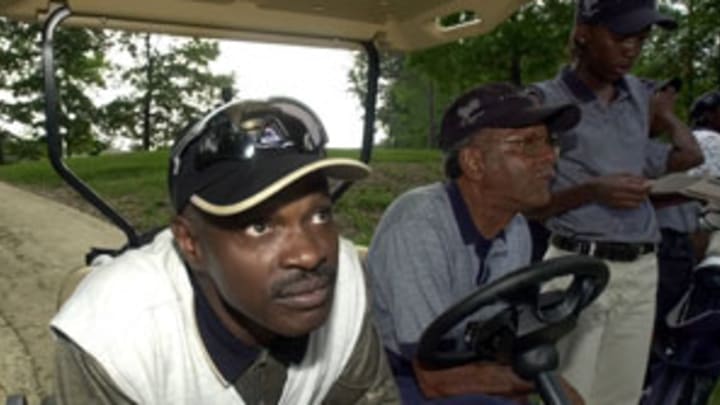Eddie Payton establishes own legacy as Jackson St. golf coach


JACKSON, Miss. -- The small plastic bag hangs behind his desk, tacked to the Astroturf-coated wall and easily missed amid the celebrity photographs, Hole in One scorecards ("I've got six! You play enough golf, you get 'em.") and miscellaneous pieces of scrap paper.
"It reminds me of where I came from," Eddie Payton says. "And what I'll be doing if I don't succeed at this."
The bag contains a handful of cotton, white and fluffy and oozing with uncomfortable meaning here in the heart of Mississippi. Growing up in the small farming town of Columbia, Eddie -- oftentimes alongside his younger brother, Walter -- spent his fair amount of time working the fields. It was a means to help contribute to his family's income, but also an unquestioned way of life for black rural southerners back in the late 1960s. "That cotton brings out vivid memories," Eddie says. "Old and young, male and female -- we all picked cotton. Didn't have much choice."
With that, a shrug. Not a bitter shrug or an angry shrug. Just an acknowledgment of what was and what is. "Can't change it," he says. "Gotta accept it."
The man sitting before me is, from a purely physical standpoint, little. He's maybe 5-foot-8, with tiny hands and a quick, compact walk that reminds me of my son's windup toy. Yet here on the campus of Jackson State University, Eddie Payton stands 20-feet tall. Yes, he was once the star halfback on Tiger teams that tore up the Southwestern Athletic Conference. And yes, he spent five seasons as a kick returner in the NFL. And yes, his sibling is, indeed, the late Sweetness, the NFL's second all-time leading rusher and a Jackson State icon.
The king of Jackson State, however, does not reign because of what he once did or who he is related to, but -- oddly -- because of what he's done to make people forget such things. Talk to him about his football career and Eddie waves away the thought. "Long ago," he says. "Old news." Talk about Walter, and while he'll tell myriad stories, few include the words I or me. "Walter was special," he says. "So special."
The subject Eddie will joyfully discuss -- and discuss and discuss and discuss and discuss -- is golf. His love of golf. His frustration with golf. His long-ago efforts to qualify for the tour. His rounds with Bill Clinton. His recruiting of Tiger Woods ("Still got the letter I sent him," he says. "Never really had a chance, but it was worth trying.") and his goal of leading Jackson State -- the small historically black college -- to an NCAA Division I men's or women's ("Or both!" he says) golf championship.
Now in his 25th season guiding the program, Payton is, without question, one of the nation's most successful collegiate golf coach. He is the 21-time SWAC Coach of the Year, and eight times has been named the National Minority Coach of the Year. Payton's men's team has won 21 SWAC Championships, and the Lady Tigers have won 13. After taking the 2001 SWAC Championship, the Lady Tigers received an at-large bid to the NCAA tournament, becoming the first women's golf program from a historically black college to receive such an honor. Payton and his men's team made NCAA history in 1996 when they became the first HBC to qualify for the NCAA Golf Regionals. "We have expectations," he says. "Very high ones."
And yet, while college coaches throughout the country let those heightened expectations serve as character depleters, caving in to boosters and myriad temptations, Payton takes himself only so seriously. He eagerly talks trash with his players, and is as quick with a laugh as he is a criticism. He'll point out Jackson State's golf plusses ("Warm weather, great courses, handsome coach") without batting an eye. When his daughter Erica, a Jackson State sophomore golfer, recently visited his office, Eddie excused himself from a conversation, reached down under his desk and pulled out a sign reading ATM. He then turned to Erica and said, "Can I help you, m'am?"
Perhaps most interestingly, Payton has worked to alter the perception of an HBC sports program. Before the SEC began integrating its teams back in the late 1960s and early 70s, black colleges like Jackson State, Grambling and Alcorn laid claim to any/every available African-American athlete. That's a major reason those schools produced dominant programs, and a major reason traditionally white colleges began swooping in. Now, although Jackson State is still considered a "black" college, Payton's teams are rainbow coalitions of whites and blacks, Americans and foreigners. "If you can play and you're willing to work hard and study, I'll be interested," he says. "This is about young people developing and fulfilling potential. Race makes no difference to me. This program is color blind."
He pauses.
"All we see is success."
